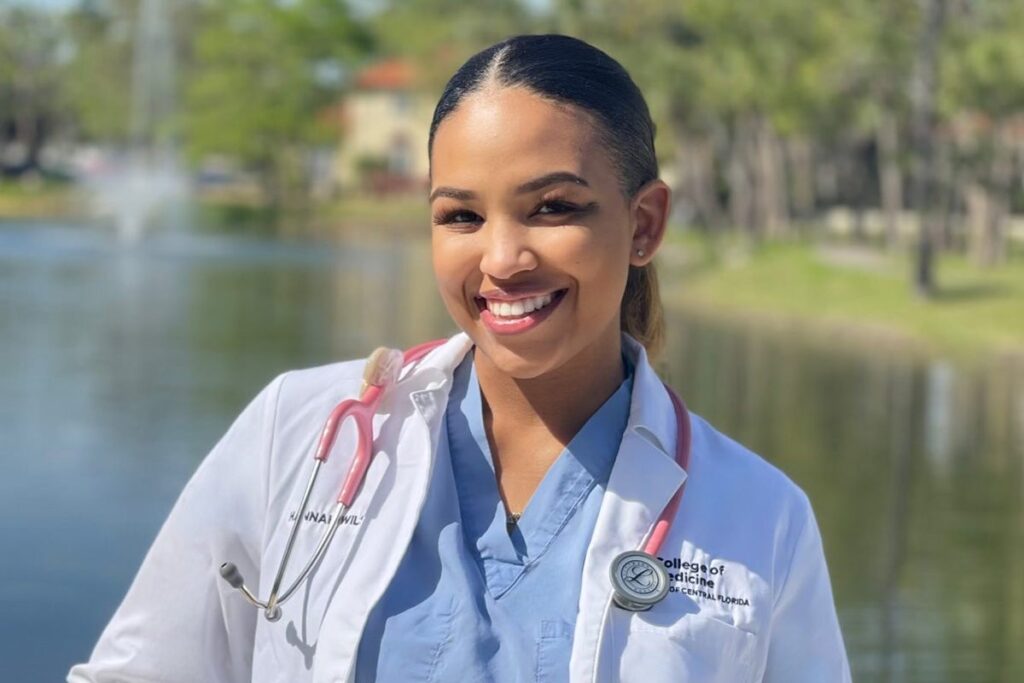UCF medical students have been recognized nationally for their work to reduce health care disparities among minorities.
Hannah Wilson, a third-year medical doctorate candidate, received the Excellence in Public Health Service Award from the U.S. Department of Health and Human Services. This award recognizes medical students' contributions to public health in their communities.
Tracy McIntosh, associate dean for access, belonging, and community engagement at the University of California School of Medicine, congratulates Wilson on this national recognition.
“Hannah's strong commitment to health equity, evidenced by her clinical research and community health experience, makes her the most deserving candidate for this award,” McIntosh says. “She leads a sustainable program to inspire, mentor and support students from historically marginalized groups, and consistently goes above and beyond the expectations of medical students. He has demonstrated leadership and clinical ability to meet the needs of students and patients.”
At UCF, Wilson serves as program leader for Medical Enrichment for Diverse Students (MEDS). MEDS is a project founded by medical students that provides mentorship and clinical experience to Orlando students from underrepresented backgrounds interested in medicine.
Students at Evans High School, Oak Ridge High School, and Jones High School benefit from medical school instruction, clinical skills workshops, patient simulations, tours, and more. The goal is to increase representation in the medical field and allow health care providers to better represent the patients they serve.


“This award means a lot to me,” Wilson says. “I didn't do these things for awards. I did these things because I had a passion for them. Especially as I'm nearing the end of my medical school career, I want to be recognized for it. It's nice to know that my work doesn't go unnoticed.”
Data shows striking differences in physician diversity compared to the general population. The Association of American Medical Colleges reported in 2019 that only 5% of physicians in the country identify as Black and 5.8% identify as Hispanic. This lack of diversity among physicians is correlated with poorer medical outcomes for patients of color. Research shows racial and ethnic minority patients are more likely to receive better communication and culturally appropriate care when treated by health care providers who share their racial or ethnic background. and have been shown to improve health outcomes.
“Minority communities have a general mistrust of the health care system,” Wilson said. “So when a patient walks into a room and sees someone who looks like them, they become more comfortable sharing that side of their story about what brought them here. And if you can build a trusting relationship with your doctor, you're more likely to follow a treatment plan because you believe your doctor has your best interests at heart. ”
Wilson also served as president of the National Student Physicians Association, leading efforts to raise awareness of health care disparities and issues faced by minority or marginalized communities.
She also volunteered at the Chapman Compassionate Care Clinic, a student-run clinic that provides care to homeless people in downtown Orlando. As a community support coordinator, she educated patients about sexually transmitted disease testing, used Narcan for drug overdoses, and connected patients to relevant resources.
At UCF, Wilson also pioneered the Bleeding with Dignity project, which aims to combat menstrual poverty by distributing menstrual products to those in need. She used funds she received from the School of Medicine's Health Equity Scholarship Program to package her menstrual care kits and donate them to student-run clinics and women's shelters.
“I want to become an obstetrician-gynecologist because I'm very passionate about women's health,” Wilson says. “The maternal mortality rate for black women is so high that I think there are doctors out there who are: [them] and believe [their] Addressing concerns is one of the biggest ways to address that disparity. ”


